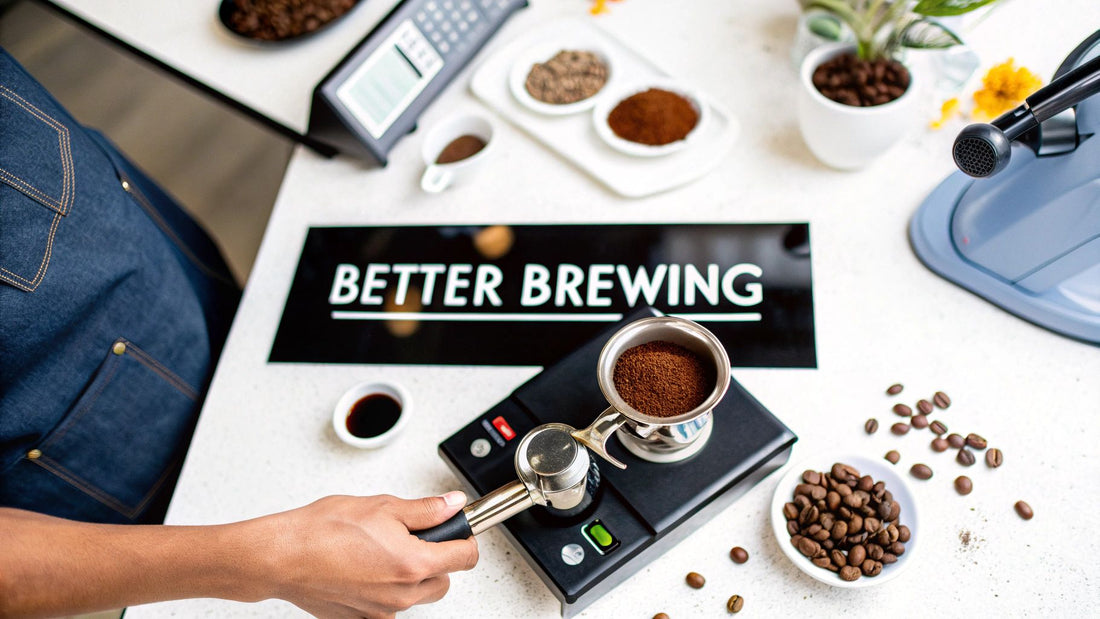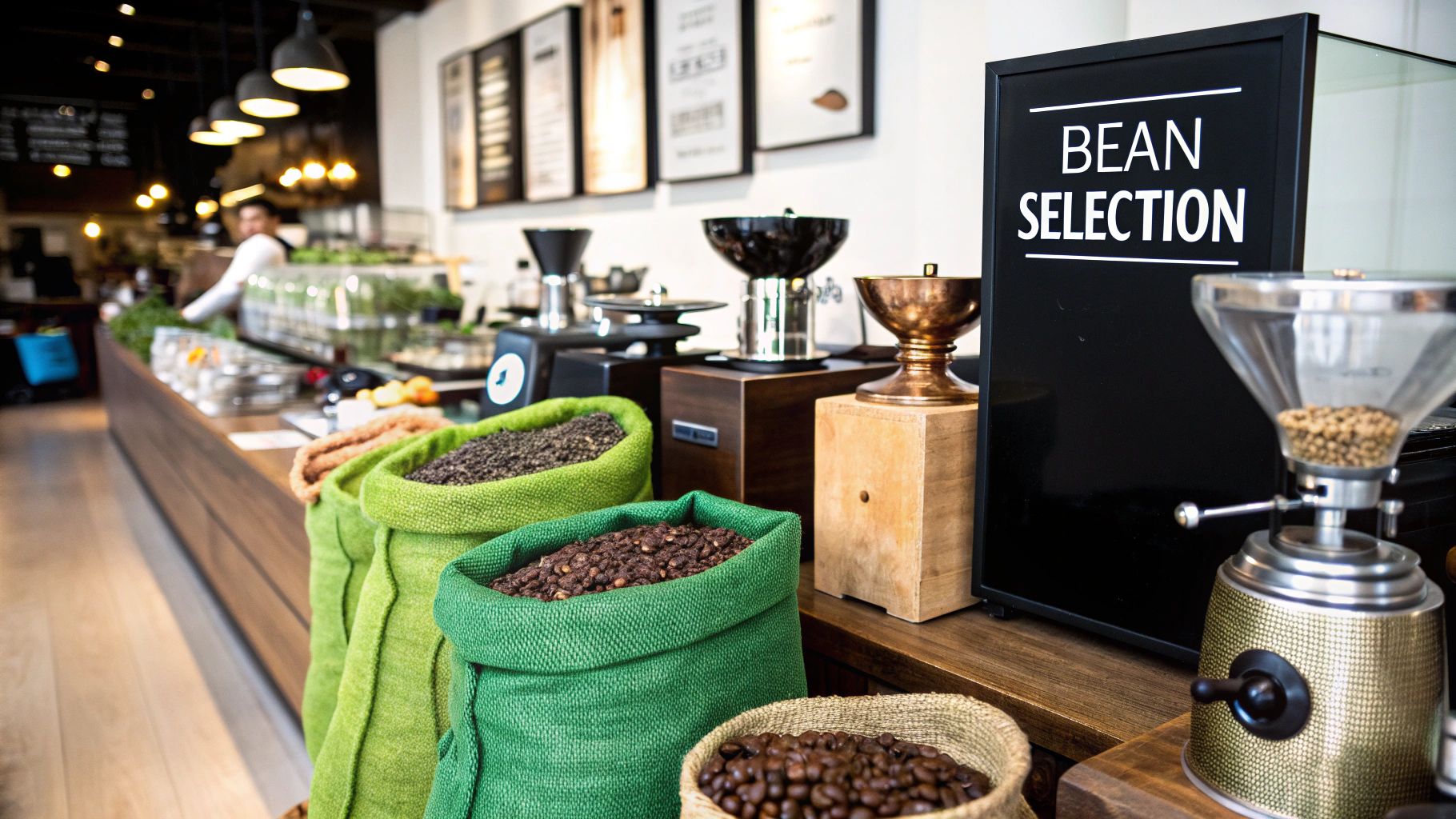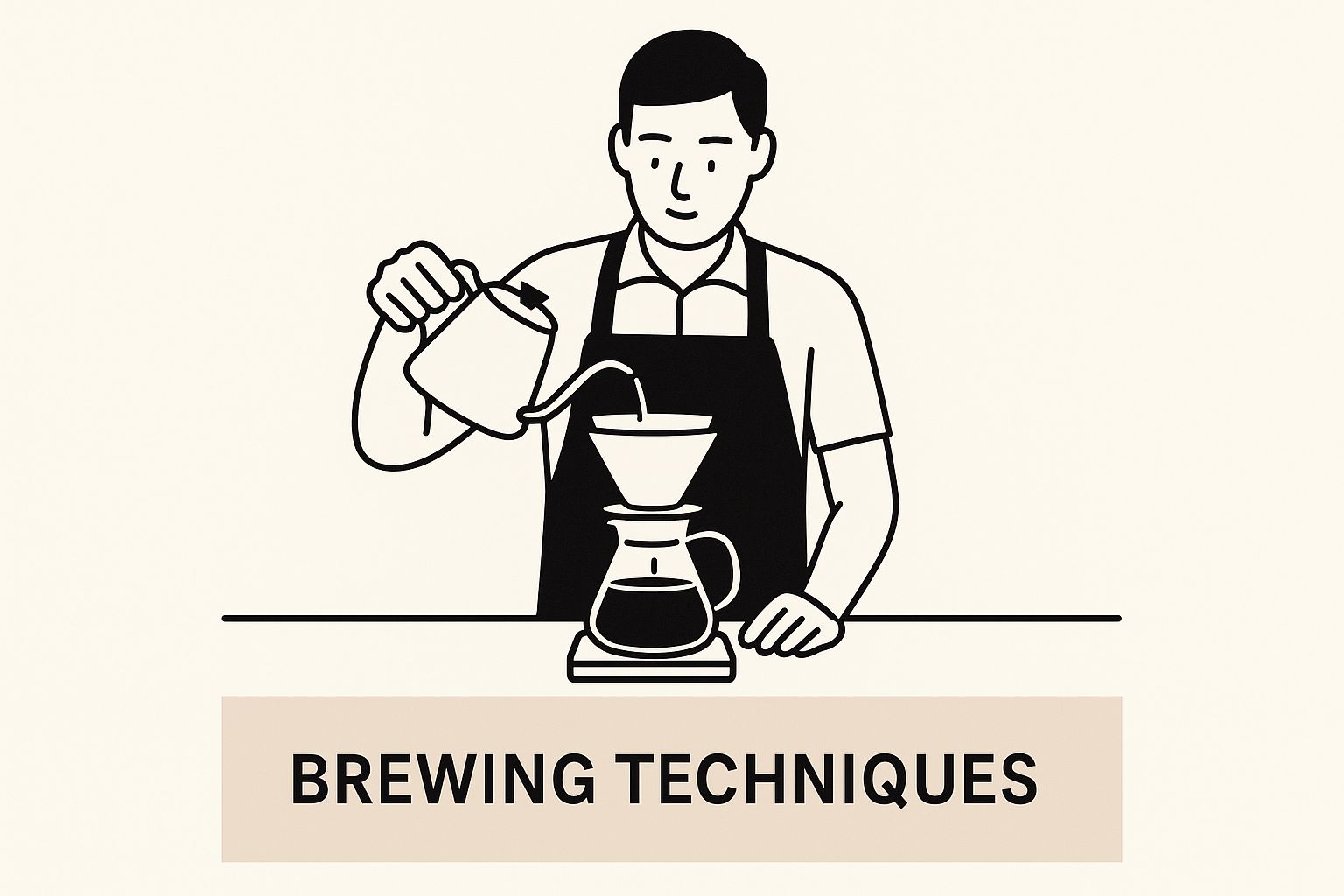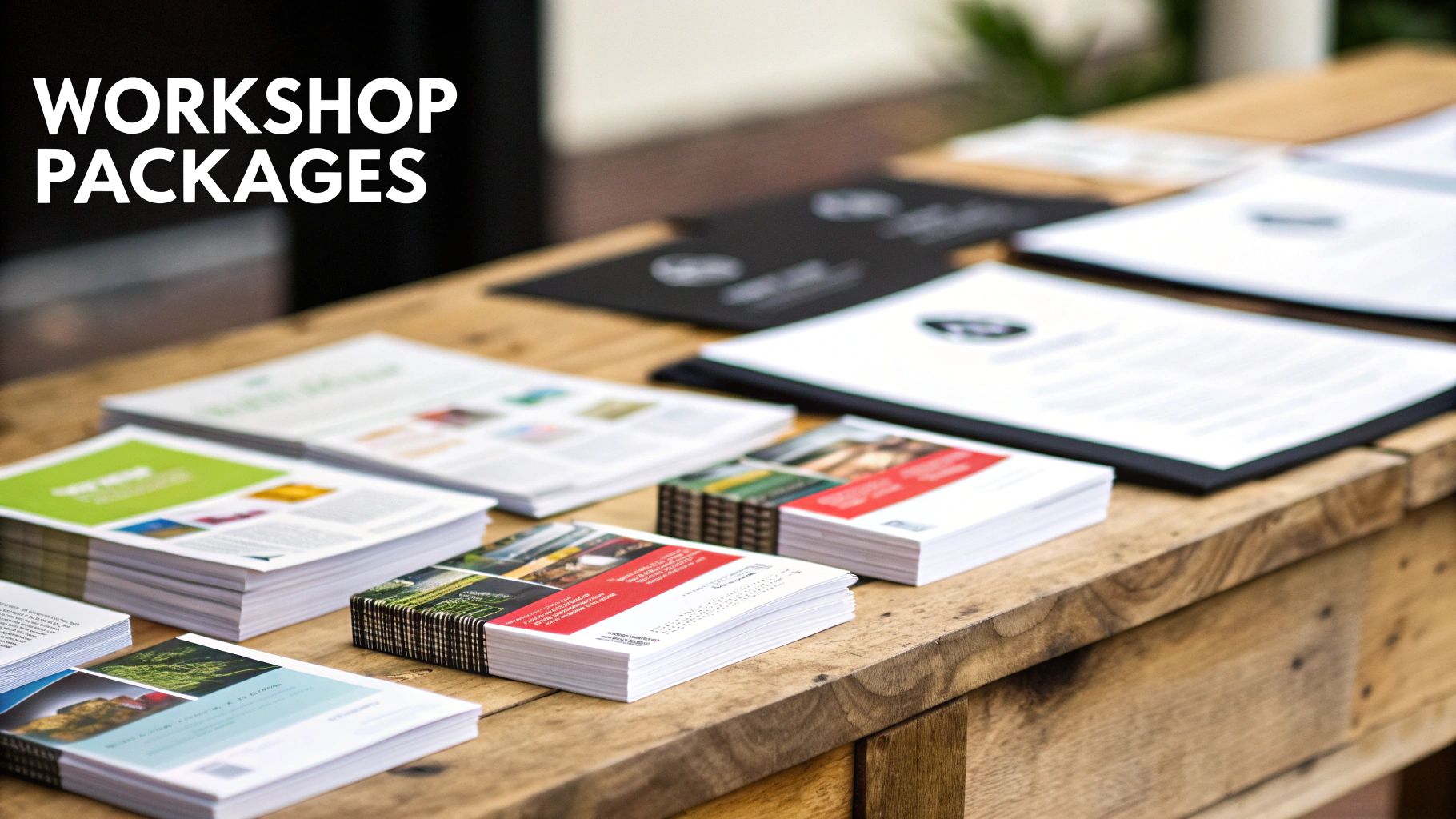
UK Coffee Workshops: A Guide to Better Brewing
Share
Ever thought about turning your daily coffee ritual from a simple habit into a rich, flavourful experience you can actually control? That’s exactly what a coffee workshop is all about. Think of it as an immersive, hands-on class designed to teach you the art and science behind a truly brilliant cup. It's your gateway to appreciating every sip on a much deeper level.
Your Journey Into the World of Speciality Coffee
Forget stuffy lectures. A coffee workshop is more like a playground for your senses. Here in the UK, these sessions have exploded in popularity, becoming a vibrant part of our coffee culture and welcoming everyone from curious home brewers to aspiring professional baristas. The real aim is to move beyond just drinking coffee to genuinely understanding and crafting it with confidence.
These experiences are designed to demystify the incredible journey from a coffee cherry on a farm to the final brew in your cup. You won't be bogged down with complex jargon. Instead, you'll get practical skills and a newfound appreciation for the craft. A workshop is your chance to finally understand what terms like 'body', 'acidity', and 'finish' really mean by tasting them for yourself.
What to Expect from a Workshop
A great coffee workshop creates a supportive and inspiring space where no question is too basic. The whole point is learning by doing, whether you're dialling in an espresso machine for the very first time or perfecting your pour-over technique. You’ll leave not just with knowledge, but with the ability to replicate cafe-quality results in your own kitchen.
The journey often includes:
- Tasting and Sensory Development: Learning to identify the subtle notes of fruit, chocolate, or spice in different coffees.
- Hands-on Brewing Practice: Getting to grips with iconic brewing equipment under the watchful eye of an expert.
- Understanding the Fundamentals: Exploring how variables like grind size, water temperature, and brew time shape the final flavour.
A workshop can ignite a lifelong passion. It connects you with a community of fellow coffee lovers and gives you a powerful new appreciation for the incredible science, art, and human effort behind every single cup you enjoy.
For those whose journey into speciality coffee might even spark a bit of entrepreneurial spirit, understanding the tools of the trade is a vital first step. You can explore a comprehensive coffee shop equipment checklist that breaks down the foundational gear needed for a professional setup. This kind of knowledge can bridge the gap between hobbyist and pro, turning a passion into a potential business. Ultimately, that first workshop is just the starting point for a delicious adventure.
Why the UK Is a Global Hub for Coffee Education

The UK's love affair with coffee has completely transformed. It's no longer just about grabbing a quick caffeine hit; it’s about craft, quality, and genuinely incredible flavour. This cultural shift has turned the country into a real nerve centre for coffee education, creating a vibrant ecosystem for anyone looking to learn.
This boom isn’t just something you see on the high street. A real thirst for knowledge has followed, fuelling huge demand for high-quality coffee workshops. This demand comes from two places. On one hand, you have cafes needing highly skilled baristas to meet ever-rising customer expectations. On the other, you have passionate home brewers who want to replicate that amazing cafe experience on their own kitchen counters.
A Culture of Quality and Curiosity
It's a fantastic cycle. The more accessible brilliant coffee becomes, the more discerning we all get. Once you’ve had a truly exceptional flat white—one with that perfect, silky texture and balanced sweetness—you start wondering why your own attempts fall short. That curiosity is the spark.
This has created a thriving industry for training. The UK coffee shop market, once a small niche, has exploded. According to a key industry report, the branded coffee shop market now includes over 12,000 outlets across the country, with no signs of slowing down. This rapid growth directly supports the rise of educational programmes, making workshops essential for both professionals and hobbyists. You can dive deeper into the market's impressive journey in the full World Coffee Portal report.
The UK's educational landscape is a direct reflection of its coffee culture. As our collective palate evolves, so does the desire to understand the "why" behind a great cup—transforming a simple beverage into a celebrated craft.
The Rise of the Speciality Roaster
At the very heart of this movement are the UK's speciality coffee roasters. They are often the pioneers, sourcing incredible green beans from across the globe and sharing their passion directly with the public. These roasters have become vital local hubs for learning, offering a direct line from the farm right to your cup.
They’re the ones providing a platform for enthusiasts to connect with coffee on a much deeper level. You’ll find them offering all sorts of experiences:
- Hands-on Barista Training: Finally learn the secrets to pulling a perfect espresso shot and steaming milk into that velvety microfoam.
- Sensory and Cupping Sessions: Train your palate to pick out the complex flavour notes—from citrus and berries to chocolate and nuts—that make each coffee unique.
- Home Brewing Masterclasses: Master popular kit like the V60, AeroPress, or French press to completely elevate your daily ritual.
This environment, so rich with opportunity, makes the UK one of the most exciting places in the world to learn about coffee. It’s a culture where knowledge is shared generously, empowering absolutely everyone to brew better.
Finding the Right Type of Coffee Workshop for You
Not all coffee workshops are born equal. Stepping into the world of speciality coffee education is a bit like exploring a city with distinct neighbourhoods; each one offers a unique vibe tailored to different goals and curiosities. Your mission is to find the workshop that truly resonates with your own coffee ambitions.
So, where do you start? Think about what really gets you excited about coffee. Is it the science and precision behind pulling a perfect espresso shot, or the creative flourish of pouring a beautiful rosetta? Maybe you're more fascinated by the subtle journey of flavour, from a fruity Kenyan bean to a chocolatey Brazilian one. Pinpointing your core interest is the first step toward choosing a workshop that feels less like a class and more like a genuine adventure.
As you explore, you'll find everything from intimate tasting sessions to larger, more practical classes. These different formats often rely on specific organisational tools, and understanding the broad spectrum of types of events that utilize event management solutions can give you an insight into what makes a workshop run so smoothly and feel professional.
To help you find the perfect fit, we've created this quick comparison table. It breaks down the main types of workshops you'll find across the UK, what they focus on, and who they're best for.
Choosing Your Ideal UK Coffee Workshop
| Workshop Type | Primary Focus | Ideal For | Key Skills Learned |
|---|---|---|---|
| Barista Skills | Espresso preparation, milk steaming, machine workflow. | Aspiring pros or home espresso machine owners. | Pulling balanced shots, achieving microfoam, drink building. |
| Latte Art | The craft of pouring steamed milk into espresso. | Creative types who want to make their coffee beautiful. | Milk texturing, pouring hearts, tulips, and rosettas. |
| Sensory & Cupping | Developing your palate and tasting vocabulary. | Anyone curious about flavour and coffee origins. | Identifying tasting notes, professional cupping protocol. |
| Home Brewing | Manual brew methods like V60, AeroPress, French Press. | Coffee lovers wanting to perfect their daily ritual. | Grind size, water temperature, brew recipes, extraction. |
Hopefully, that gives you a clearer picture. Now, let's dive into what each of these experiences actually feels like.
For the Hands-On Creator: Barista and Latte Art Skills
If you dream of turning your kitchen into a miniature version of your favourite local cafe, a Barista Skills workshop is your ideal starting point. These sessions are intensely practical, focusing on the machinery and techniques behind all those espresso-based drinks you love. You’ll get your hands on professional-grade equipment, learning to pull rich, balanced shots and steam milk to that silky, microfoam texture.
These workshops are spot-on for:
- Aspiring professional baristas looking for solid foundational skills.
- Home enthusiasts who’ve just invested in an espresso machine.
- Anyone determined to finally master a flawless flat white or cappuccino.
Closely related, a Latte Art workshop is where coffee meets pure creativity. While a barista course covers the basics of milk steaming, a latte art class is a deep dive into the technique of pouring. It’s a session dedicated to practice, patience, and precision, guiding you from pouring a simple heart to more intricate patterns like tulips and rosettas. It's just pure, satisfying fun.
A barista skills workshop gives you the science of a great coffee, while a latte art class gives you the soul. One builds the delicious foundation, the other adds the beautiful finish.
For the Curious Palate: Sensory and Cupping Workshops
Ever read the tasting notes on a bag of coffee—like "strawberry jam, black tea, and orange"—and wondered how on earth anyone could taste all that? A Sensory and Cupping workshop is designed to demystify that exact experience. This isn’t about brewing; it’s all about tasting.
In these sessions, you’ll take part in a professional coffee tasting protocol known as "cupping." This involves smelling and slurping coffees from all over the world, side-by-side, to train your palate to identify and describe different aromas, flavours, acidity, and body. It’s a real eye-opener that will permanently change how you taste and appreciate coffee.

As this shows, mastering the core brewing methods gives you the foundation you need before moving on to more advanced skills like sensory analysis or latte art.
For the Dedicated Home Brewer
If your passion lies in perfecting your morning filter coffee, then a Home Brewing masterclass is the perfect fit. These coffee workshops focus on manual brewing methods that don't need a pricey espresso machine, making them incredibly accessible for just about anyone.
You’ll get hands-on experience with iconic devices like the V60, AeroPress, and French Press. You'll learn how tiny adjustments to your grind size, water temperature, and pouring technique can dramatically alter the flavour in your cup. It’s the ultimate way to elevate your daily ritual into something special, giving you the confidence to brew consistently delicious coffee, every single time.
The Real Pay-Off of a Coffee Workshop
Dipping your toes into a coffee workshop is an investment that pays you back long after the final sip. Think of it as an upgrade—not just for your coffee, but for your entire approach to it. Whether you're a home brewer looking to nail that perfect morning cup or an industry pro aiming to climb the ladder in the UK's buzzing speciality scene, the rewards are real, lasting, and can genuinely transform your relationship with coffee.
For the home enthusiast, the benefits hit you right away. Imagine confidently dialling in your grinder and brewing a coffee that's every bit as good—or even better—than your favourite local café. You’ll save a bit of cash, wow your friends, and turn a daily habit into a moment of pure, satisfying craft. It’s all about getting a handle on the variables and finally understanding why some brews are brilliant while others just don't hit the mark.
If you’re already in the coffee game or want to be, dedicated training is a massive career boost. Proper, hands-on coffee workshops arm you with the technical skills and deeper knowledge that make you stand out. It’s the difference between just following a recipe and truly getting the science behind extraction, how to texture milk perfectly, and what creates that beautiful flavour balance in the cup.
From Daily Ritual to Passionate Pursuit
This kind of focused learning builds the confidence you need to work quicker, smarter, and pour consistently fantastic coffee. It opens doors to better roles in the UK's top speciality cafés and roasteries, which means more fulfilling work and, ultimately, happier customers who can taste the difference.
But it’s not all about the practical stuff. A workshop can be the very spark that turns a casual interest into a full-blown passion. You’re suddenly in a room with a whole community of people who are just as curious and excited as you are. That social connection is a huge, and often overlooked, part of the experience.
A coffee workshop does more than teach you skills; it gives you a new language. You start to find the words for what you're tasting, share that with others, and gain a whole new appreciation for the incredible journey from farm to cup.
Meeting a Growing UK Demand for Quality
And that desire for knowledge is absolutely booming across Britain. With the UK getting through around 98 million cups of coffee daily, there’s a massive swing towards people wanting better quality at home. This shift is driven by all of us who visit great coffee shops and then want to bring that experience back to our own kitchens, fuelling the demand for hands-on coffee workshops. You can dive deeper into these fascinating trends by reading these insights into UK coffee consumption habits.
This shared, communal vibe also makes workshops a brilliant choice for group events. If you're looking for something a bit different for a corporate away day, these sessions are fantastic team building activities that get people collaborating and learning together. It's a creative and genuinely memorable way to connect, all while enjoying some delicious coffee.
How to Choose the Right UK Coffee Workshop

With so many fantastic coffee workshops popping up across the UK, picking the right one can feel like a real head-scratcher. How do you find a session that will genuinely deliver the goods and leave you buzzing with new skills? It’s not just about picking a course off a list; it’s about investing in an experience that lines up perfectly with your own coffee goals.
To make a smart choice, you have to look past the slick marketing and zero in on what really matters for hands-on learning. The best workshops are always built on a solid foundation of expertise, quality kit, and a genuine passion for sharing the love of coffee.
Assess the Instructor and Reputation
Honestly, the person leading your workshop is the single most important factor. You want to look for instructors with proper, real-world experience. Are they former or current head baristas, seasoned roasters, or competition judges? A great teacher doesn't just know their stuff; they know how to share it with passion and patience.
Check for reviews and testimonials, not just on their website but on independent platforms too. What are people who have actually been there saying? Reputable training centres and roasteries across the UK build their names on the quality of their teaching, so a little bit of digging goes a very long way.
The Importance of Class Size
This is a crucial detail that’s so easy to overlook. A larger class might look cheaper on paper, but a smaller group nearly always offers a far better learning environment.
A small class size ensures you get that vital one-on-one time with the instructor. It means less waiting around and more doing—which is critical for mastering practical skills like dialling in an espresso shot or finally perfecting your milk-steaming technique.
Look for workshops that shout about their low student-to-instructor ratio. Ideally, you’re after a class with no more than four to six participants per station. This is your guarantee that you’ll actually get your hands on the equipment and receive personalised feedback to help you improve.
Evaluate the Curriculum and Equipment
A great workshop will have a clear, logical structure. Before you even think about booking, have a good look at the course outline. Does it actually match what you want to learn? If you’re a keen home brewer, a curriculum focused heavily on commercial machine maintenance probably isn’t the best fit for you.
- Curriculum Alignment: Does the workshop description clearly state the skills you'll walk away with, and do they align with your coffee ambitions?
- Equipment Quality: Will you be training on professional-grade gear? Learning on high-quality espresso machines and grinders gives you a true feel for the craft.
- Coffee Supply: Does the workshop provide a good variety of high-quality, freshly roasted coffee for you to work with and taste?
Don't be afraid to ask questions before you book. A quality provider will be more than happy to tell you about the machines you'll be using and the specific skills covered. By carefully considering these key elements, you can find a UK coffee workshop that provides a truly valuable, hands-on education—making sure your investment is well and truly spent.
How to Prepare for Your First Coffee Workshop
You’ve picked your course, booked your spot, and the day is just around the corner. That feeling of anticipation is half the fun, but a little prep work can be the difference between a good experience and a truly great one. Getting the most out of a coffee workshop isn’t just about turning up; it’s about arriving ready to soak up every last drop of knowledge.
Think of it like getting ready for a hike. You wouldn't show up in flip-flops without a map. In the same way, a few simple steps beforehand will make sure you’re ready to navigate the world of speciality coffee with confidence and leave feeling genuinely inspired.
Setting the Stage for Success
The single most important thing you can bring is an open and curious mind. Be prepared to challenge what you think you know about coffee and embrace new ideas from the get-go.
Instructors love questions, so spend a few moments thinking about what you really want to learn. Is there a stubborn brewing problem you have at home? Are you curious about a specific coffee origin? Jot down a few things you'd love to ask.
Here are a few practical pointers to get you started:
- Go Easy on the Scents: Please don’t wear strong perfumes or aftershaves. These can seriously mess with your sense of smell, which is absolutely vital for appreciating coffee's complex aromas, especially in a sensory class.
- Keep Your Palate Clean: If you're heading to a tasting or cupping workshop, it's a good idea to skip your usual morning latte or anything with strong flavours. Arriving with a fresh palate means you can actually detect the subtle, delicate notes in the coffees you’ll be sampling.
- Dress for Comfort: You'll probably be on your feet for a fair bit of the session, particularly during any hands-on barista training. Comfortable shoes and clothes you can move around in are a must.
Remember, a workshop is the exciting first step on a much longer journey. It’s designed to give you a solid foundation and spark your passion, not to make you a master overnight. Embrace the learning process with patience and enthusiasm.
During and After the Workshop
Once you're in the class, the key is to be present and get involved. Bring a notebook and take notes—you’ll be amazed how many small but crucial details you might otherwise forget.
And don’t be shy about connecting with your classmates. Sharing the experience and talking about what you're learning is a brilliant way to deepen your understanding and build a sense of community.
After the workshop ends, the real work begins. Your notes will become an invaluable guide as you start putting your new skills into action. Try to practise what you've learned as soon as you can, while it's all still fresh in your mind. That’s how you lock in the knowledge and build real, lasting confidence in your brewing.
Got Questions About UK Coffee Workshops? We've Got Answers
Stepping into the world of coffee education can feel a little daunting. You've got questions, and that's completely normal. Whether you're a total newcomer or you're looking to sharpen your skills, this section will give you the clear, straightforward answers you need to book your first coffee workshop with total confidence.
Do I Need Any Experience to Join a Workshop?
Absolutely not! The brilliant thing about the UK coffee scene is how welcoming it is. Most roasters and training centres design their courses with everyone in mind. Classes with names like ‘Introduction to Home Brewing’ or ‘Barista Basics’ are built from the ground up for people who have never touched an espresso machine before.
Just be sure to read the course description before you book. While the introductory stuff is fair game for all, some of the more advanced masterclasses—think sensory analysis or professional-level espresso techniques—might have prerequisites. This just ensures everyone in the room is on the same page and gets the most out of the day.
How Much Does a UK Coffee Workshop Typically Cost?
Prices for coffee workshops can swing a fair bit, usually depending on where you are in the UK, what you're learning, and how long the session lasts. To give you a rough idea of what to budget for:
- Short Introductory Classes (2-3 hours): These are perfect for dipping your toes in. If you want to nail your latte art or master a specific brewer, expect to pay between £50 and £100.
- Full-Day Barista Courses: For a more immersive, hands-on day covering the A-to-Z of being a barista, costs typically range from £150 to £300.
- Professional Certifications: Multi-day, accredited courses are a bigger investment, as you'd expect. The higher price tag reflects their depth and the industry-wide recognition they carry.
Will I Get a Certificate After the Workshop?
This really comes down to the kind of workshop you choose. A lot of local roasteries and independent training schools provide a lovely, informal certificate of attendance—it’s a great memento of a fun experience.
But if you're looking at coffee as a career path, you'll want to aim for workshops accredited by a recognised body like the Specialty Coffee Association (SCA). These qualifications are respected across the globe and are a serious asset for anyone looking for a job in the UK coffee industry. They really do boost your professional credentials.
The UK's love affair with great coffee isn't slowing down. This huge demand is what’s fuelling the rise in coffee workshops, as both home enthusiasts and aspiring pros get hungry for more knowledge about everything from bean origins to brewing science.
The numbers back this up. It's predicted that weekly out-of-home coffee consumption will jump to 15.1% by 2025. That’s nearly 7.9 million people hitting up coffee shops on a regular basis. You can get a deeper look at the numbers in this detailed UK coffee market analysis.
What Is the Difference Between Cupping and Brewing?
Think of it like this: a cupping workshop is all about training your palate. It’s a focused sensory session where you learn to properly taste, evaluate, and describe the incredible range of aromas and flavours locked inside different coffees, usually sampling them side-by-side.
A brewing workshop, on the other hand, is all about getting your hands dirty. This is where you are the one making the coffee. You'll learn the practical techniques and recipes to pull a perfect shot of espresso, pour a silky-smooth V60, or master the AeroPress. It’s about the doing.
At Ue Coffee Roasters, we believe that a brilliant cup of coffee starts with knowledge and passion. Our hands-on masterclasses and sensory workshops are designed to empower you with the skills to elevate your brewing, whether at home or in a professional setting.
Explore our full range of coffee workshops and start your journey today.
